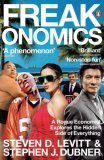Summary | Excerpt | Reading Guide | Reviews | Readalikes | Genres & Themes | Author Bio
A Rogue Economist Explores the Hidden Side of Everything

Critics' Opinion:
Readers' Opinion:
First Published:
Apr 2005, 256 pages
Paperback:
Apr 2006, 256 pages
Right?
A real-estate agent is a different breed of expert than a criminologist,
but she is every bit the expert. That is, she knows her field far better
than the layman on whose behalf she is acting. She is better informed about
the house's value, the state of the housing market, even the buyer's frame
of mind. You depend on her for this information. That, in fact, is why you
hired an expert.
As the world has grown more specialized, countless such experts have made
themselves similarly indispensable. Doctors, lawyers, contractors,
stockbrokers, auto mechanics, mortgage brokers, financial planners: they all
enjoy a gigantic informational advantage. And they use that advantage to
help you, the person who hired them, get exactly what you want for the best
price.
Right?
It would be lovely to think so. But experts are human, and humans respond
to incentives. How any given expert treats you, therefore, will depend on
how that expert's incentives are set up. Sometimes his incentives may work
in your favor. For instance: a study of California auto mechanics found they
often passed up a small repair bill by letting failing cars pass emissions
inspections -- the reason being that lenient inspections are rewarded with
repeat business. But in a different case, an expert's incentives may work
against you. In a medical study, it turned out that obstetricians in areas
with declining birth rates are much more likely to perform cesarean-section
deliveries than obstetricians in growing areas -- suggesting that, when
business is tough, doctors try to ring up more expensive procedures.
It is one thing to muse about experts' abusing their position and another
to prove it. The best way to do so would be to measure how an expert treats
you versus how he performs the same service for himself. Unfortunately a
surgeon doesn't operate on himself. Nor is his medical file a matter of
public record; neither is an auto mechanic's repair log for his own car.
Real-estate sales, however, are a matter of public record. And
real-estate agents often do sell their own homes. A recent set of data
covering the sale of nearly 100,000 houses in suburban Chicago shows that
more than 3,000 of those houses were owned by the agents themselves.
Before plunging into the data, it helps to ask a question: what is the
real-estate agent's incentive when she is selling her own home? Simple: to
make the best deal possible. Presumably this is also your incentive when you
are selling your home. And so your incentive and the real-estate agent's
incentive would seem to be nicely aligned. Her commission, after all, is
based on the sale price.
But as incentives go, commissions are tricky. First of all, a 6 percent
real-estate commission is typically split between the seller's agent and the
buyer's. Each agent then kicks back half of her take to the agency. Which
means that only 1.5 percent of the purchase price goes directly into your
agent's pocket.
So on the sale of your $300,000 house, her personal take of the $18,000
commission is $4,500. Still not bad, you say. But what if the house was
actually worth more than $300,000? What if, with a little more effort and
patience and a few more newspaper ads, she could have sold it for $310,000?
After the commission, that puts an additional $9,400 in your pocket. But the
agent's additional share -- her personal 1.5 percent of the extra $10,000 --
is a mere $150. If you earn $9,400 while she earns only $150, maybe your
incentives aren't aligned after all. (Especially when she's the one paying
for the ads and doing all the work.) Is the agent willing to put out all
that extra time, money, and energy for just $150?
The foregoing is excerpted from Freakonomics by Steven D. Levitt and Stephen J. Dubner. All rights reserved. No part of this book may be used or reproduced without written permission from HarperCollins Publishers, 10 East 53rd Street, New York, NY 10022





The Flower Sisters
by Michelle Collins Anderson
From the new Fannie Flagg of the Ozarks, a richly-woven story of family, forgiveness, and reinvention.

The House on Biscayne Bay
by Chanel Cleeton
As death stalks a gothic mansion in Miami, the lives of two women intertwine as the past and present collide.

The Funeral Cryer by Wenyan Lu
Debut novelist Wenyan Lu brings us this witty yet profound story about one woman's midlife reawakening in contemporary rural China.
Your guide toexceptional books
BookBrowse seeks out and recommends the best in contemporary fiction and nonfiction—books that not only engage and entertain but also deepen our understanding of ourselves and the world around us.